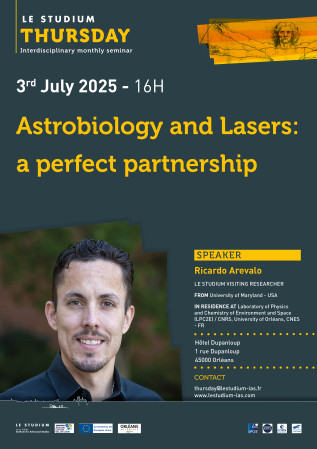Ricardo Arevalo

From
In residence at
Laboratory of Physics and Chemistry of Environment and Space (LPC2E) / CNRS, University of Orléans, CNES - FR
Host scientist
Christelle Briois
Biography
Ricardo Arevalo Jr. is a Professor of Geology and Director of the M-CLASS Laboratory at the University of Maryland. Before joining the university in 2017, he was a civil servant at NASA Goddard Spaceflight Center and served as the Product Development Lead for the mass spectrometer subsystem of the MOMA instrument onboard the ExoMars Rosalind Franklin rover. Prof. Arevalo is an expert in the development and application of in situ methods of chemical analysis, particularly: sector field, Orbitrap, time-of-flight, and ion trap mass spectrometry; and, laser microprocessing. His scientific research is focused on: i) establishing compositional models for the Earth and other bodies; ii) detecting signs of life (extant or extinct); and, iii) characterizing the biosignature preservation potential of habitable environments. He approaches these objectives through the development of innovative technologies that can be deployed in the field, definition of mission concepts that address major science questions, and in-depth laboratory studies of terrestrial, extraterrestrial, and planetary analog samples.
Project
Advancing the capabilities of laser-based mass spectrometry in support of life detection objectives and future missions to Enceladus
The international community’s prioritization of Enceladus as an astrobiology target, coupled with the scheduled release of the NASA New Frontiers 5 Announcement of Opportunity, formulation of ESA L4 mission concepts, and upcoming launch of Europa Clipper, stress the time is now to invest in research that can support Enceladus exploration. Laser desorption mass spectrometry (LDMS) protocols need to be developed, demonstrated, and qualified for spaceflight to enhance the sensitivity of measurements, mitigate the risk for false positive biomarker detection, and ultimately maximize the science return of future astrobiology missions (including those targeting Enceladus). To inform the LDMS community, advance the cutting-edge of spaceflight instrumentation, and position our international team to respond to imminent mission opportunities (particularly those targeting Enceladus), we propose to:
1. INVESTIGATE the controls on LDMS ionization efficiency by experimentally characterizing the effects of electrical conductivity, thermal conductivity, work function, and effective surface area of sample probes compatible with instrumentation developed through NASA and ESA funding and baselined for several mission concepts (including an Enceladus Orbilander);
2. QUANTIFY instrument sensitivity and extrapolate limits of detection for prospective biomarkers prioritized by the astrobiology community as a function of probe design, including sample probes with inorganic features applied to the surface, and endogenous salt content of the sample; and,
3. INFORM on the optimal mechanical design of sample handling systems for both NASA- and ESA-led mission concepts targeting Enceladus.
The original prototype of the flight-qualified CORALS (Characterization of Ocean Residues And Life Signatures) instrument, which defines the state-of-the-art of planetary mass spectrometers, will be leveraged to investigate the performance capabilities of LDMS techniques and ultimately inform on how to enhance sensitivity for astrobiology science objectives.

